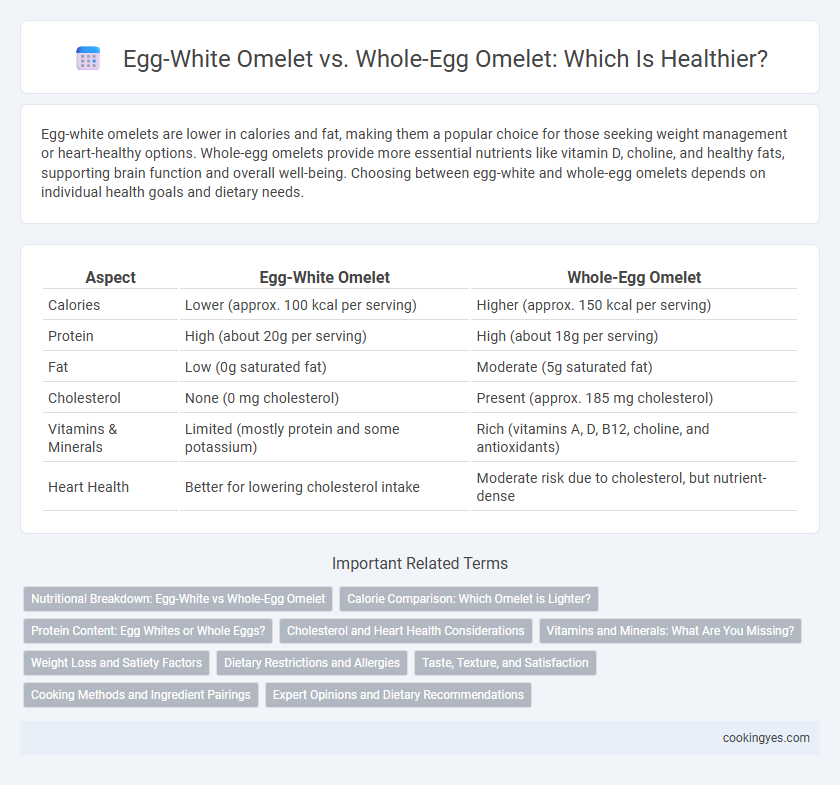Egg-white omelets are lower in calories and fat, making them a popular choice for those seeking weight management or heart-healthy options. Whole-egg omelets provide more essential nutrients like vitamin D, choline, and healthy fats, supporting brain function and overall well-being. Choosing between egg-white and whole-egg omelets depends on individual health goals and dietary needs.
Table of Comparison
| Aspect | Egg-White Omelet | Whole-Egg Omelet |
|---|---|---|
| Calories | Lower (approx. 100 kcal per serving) | Higher (approx. 150 kcal per serving) |
| Protein | High (about 20g per serving) | High (about 18g per serving) |
| Fat | Low (0g saturated fat) | Moderate (5g saturated fat) |
| Cholesterol | None (0 mg cholesterol) | Present (approx. 185 mg cholesterol) |
| Vitamins & Minerals | Limited (mostly protein and some potassium) | Rich (vitamins A, D, B12, choline, and antioxidants) |
| Heart Health | Better for lowering cholesterol intake | Moderate risk due to cholesterol, but nutrient-dense |
Nutritional Breakdown: Egg-White vs Whole-Egg Omelet
Egg-white omelets contain fewer calories and almost zero fat, making them an excellent choice for low-calorie diets, while whole-egg omelets provide essential nutrients such as vitamin D, choline, and healthy fats primarily found in the yolk. The protein content in egg-whites is high and lean, supporting muscle growth without added cholesterol, whereas whole eggs offer more balanced nutrition with higher levels of vitamins A, E, and B12. Choosing between an egg-white or whole-egg omelet depends on dietary goals, with egg-whites focusing on low fat and cholesterol and whole eggs promoting comprehensive nutrient intake.
Calorie Comparison: Which Omelet is Lighter?
An egg-white omelet contains approximately 17 calories per large egg white, making it significantly lower in calories compared to a whole-egg omelet, which has about 70 calories per large egg. The reduction in fat and cholesterol by excluding the yolk contributes to the lighter calorie count, supporting weight management and heart health goals. Choosing an egg-white omelet can reduce calorie intake by up to 75% per serving, making it a preferable option for those seeking a low-calorie, high-protein breakfast.
Protein Content: Egg Whites or Whole Eggs?
Egg-white omelets provide a high-protein, low-calorie option with almost pure protein and minimal fat, making them ideal for muscle building and weight management. Whole-egg omelets contain slightly fewer grams of protein but offer additional nutrients like healthy fats, vitamins A, D, and B12, and choline, which support brain function and overall health. Choosing between egg-white and whole-egg omelets depends on dietary goals, with egg whites favored for lean protein intake and whole eggs preferred for balanced nutrition.
Cholesterol and Heart Health Considerations
Egg-white omelets contain no cholesterol, making them a heart-healthy choice for individuals managing cholesterol levels or cardiovascular risk. Whole-egg omelets provide essential nutrients such as choline and vitamin D but also include dietary cholesterol, which may impact blood cholesterol levels in sensitive individuals. Choosing egg-white omelets supports lower cholesterol intake and reduced risk of heart disease, while whole-egg omelets offer balanced nutrition beneficial for overall health.
Vitamins and Minerals: What Are You Missing?
Egg-white omelets provide a low-calorie, high-protein option but lack essential vitamins and minerals such as vitamin D, vitamin B12, and iron found in whole eggs. Whole-egg omelets retain these nutrients, supporting bone health, energy production, and oxygen transport in the body. Choosing whole-egg omelets ensures a more balanced intake of vitamins and minerals crucial for overall health.
Weight Loss and Satiety Factors
Egg-white omelets offer a low-calorie, high-protein option ideal for weight loss due to minimal fat content and reduced cholesterol levels. Whole-egg omelets provide additional nutrients like vitamins A, D, and E, along with healthy fats that enhance satiety, potentially reducing overall calorie intake. Research suggests balancing egg consumption to leverage egg whites for calorie control while including yolks for sustained fullness and metabolic support.
Dietary Restrictions and Allergies
Egg-white omelets are ideal for individuals with dietary restrictions focused on low cholesterol and reduced calorie intake, as they contain no yolk and are rich in protein while lacking fat. Whole-egg omelets provide essential nutrients like vitamins A, D, and E, as well as choline, but may pose challenges for those with cholesterol concerns or egg yolk allergies. People with egg allergies should avoid both types, although egg-white allergies specifically require avoiding egg-white omelets.
Taste, Texture, and Satisfaction
Egg-white omelets provide a lighter texture with lower calories and fat, ideal for those seeking heart-healthy options without compromising protein intake. Whole-egg omelets offer richer taste and creamier texture due to yolk's fat and lecithin content, enhancing overall satisfaction and nutrient absorption. Choosing whole eggs balances flavor and essential vitamins like vitamin D and choline, while egg whites emphasize lean protein with minimal cholesterol.
Cooking Methods and Ingredient Pairings
Egg-white omelets, cooked with minimal oil using methods like steaming or non-stick frying, offer a low-calorie, high-protein option ideal for lean muscle building and heart health. Whole-egg omelets, prepared with moderate heat to preserve yolk nutrients, provide essential vitamins A, D, and B12, promoting brain function and eye health when paired with antioxidant-rich vegetables such as spinach or tomatoes. Combining cooking techniques that preserve nutrient integrity with ingredient pairings like avocado or mushrooms enhances the omelet's overall nutritional profile, supporting better metabolic health and satiety.
Expert Opinions and Dietary Recommendations
Experts emphasize that egg-white omelets offer lower cholesterol and saturated fat, benefiting heart health, while whole-egg omelets provide essential nutrients such as vitamin D, choline, and healthy fats. Dietary guidelines recommend choosing egg whites for individuals managing cholesterol or calorie intake, whereas whole eggs suit those seeking balanced nutrition and cognitive support. Research from the American Heart Association highlights moderation, suggesting whole eggs can fit into a healthy diet when consumed alongside nutrient-rich foods.
Egg-white omelet vs Whole-egg omelet for healthiness Infographic

 cookingyes.com
cookingyes.com